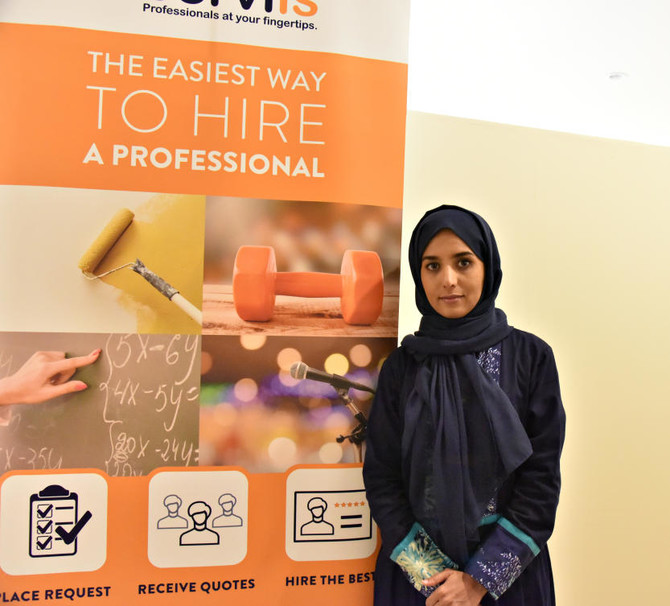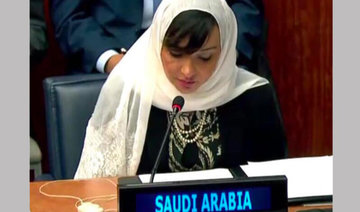LONDON: With a 130 percent increase in the number of women employed by the private sector in Saudi Arabia over the past four years, the Kingdom’s workforce is undergoing a transformation aimed at ushering in a new economic era.
When Wafaa Al-Ashwali launched a startup in Saudi Arabia earlier this year, she tapped into a burgeoning community of established female entrepreneurs.
Stepping into a sphere traditionally reserved for men, she has had to work harder and be more enterprising than male counterparts, but five months later her app Serviis, which connects consumers with more than 2,500 service providers across the Kingdom, has a steady client base of more than 700.
Her success speaks for the business opportunities unfolding for women in KSA, where there has been a 130 percent increase in their number in the private sector during the past four years.
“There has been a push from government to empower more female entrepreneurs,” Al-Ashwali said.
Almost 40 percent of the startups launched in 2016 were owned by women — an indication of the social and economic evolution that is underway as the Kingdom pursues ambitious aims outlined in its Vision 2030.
Speaking to Arab News earlier this month, the governor of the General Authority for Small and Medium Enterprises, Ghassan Al-Sulaiman pinpointed startups as a particular focus for development.
With plans to boost the proportion of women in the workforce to 30 percent by 2030, Saudi Arabia’s once-sidelined female population is being harnessed to facilitate this growth.
At a recent job fair attended by 43,000 women and hosted by Saudi women’s recruitment agency Glowork, more than 86 local and international organizations gathered seeking to source female talent for their KSA operations.
“They were there purely to hire Saudi women and it showed the appetite of the organizations to get women into their industries at all levels,” said Khalid Al-Khudair, founder of Glowork, itself a startup.
Previously, companies in Saudi Arabia hired women to fill compulsory quotas. Now, Al-Khudair said, “it has become something that makes business sense for organizations,” with women taking on a greater number of roles across different sectors.
“Saudi females represent a talented, well-educated pool of labor. Today, more Saudi women than men are attaining university degrees,” said David Hunt, founder of Dubai-based company Lynwood Consulting.
“The educational reforms have produced a new generation of women with a high degree of training, education and knowledge who are assuming their rightful place in society.”
Across the Middle East, women outnumber men in universities but countries are largely failing to utilize their female talent pools with women’s participation in the workforce across the region among the lowest in the world, according to Reuters.
The upshot is a failure to fully reap the so-called “demographic dividend” that would fuel economic growth, as well as a drag on programs aimed at empowering women in order to fulfil the economic agenda set by government.
Currently, just 1.9 million of the 13.1 million women in Saudi Arabia participate in the workforce, giving it the largest gender imbalance in labor force participation among G-20 countries, according to the “G-20 Saudi Arabia Labour Market Report 2016.”
New initiatives aim to redress this imbalance such as the launch of the first all-female business process services center in Riyadh by Saudi Aramco, General Electric and Tata Consultancy Services to provide employment for more than 1,000 women and the first all-women business and technology park, which aims to provide employment for 20,000 women over the next decade.
“Saudi Arabia has already invested heavily in education for women,” said Jane Kinninmont, deputy head of the Middle East and North Africa program at Chatham House in London.
“Enabling more women to enter the workforce allows the economy to earn a return on that investment,” she added.
“Having women in business is good for diversity and there is significant research being done internationally on the positive impact of gender diversity on management and innovation.”
Doors are opening these days with more women entering the workforce, and the once male-dominated business environment is becoming a more equal place.
Hunt noticed the change during a recent trip to Riyadh. “I visited the operations of one of the leading insurance companies,” he said. “In the past women would have been working behind closed doors in separate sections with separate lifts. Now men and women work side by side in large open-plan spaces.
“It was also pleasing to see women taking on more senior roles,” he added, pointing to the appointment of several women to high-powered positions in KSA.
Rania Nashar became the first woman to head a commercial bank in the Kingdom earlier this year when she was named chief executive of Samba Financial Group. Latifa Al-Sabhan serves as the chief financial officer of Arab National Bank, while in February Sarah Al-Suhaimi, CEO of NCB Capital, became the first woman to chair the Saudi stock exchange.
Opportunities are also opening up lower down the ladder as Saudi women seize the moment in the wake of the latest round of reforms.
“The policy environment is becoming more favorable to women working — the recent decision (to lift the ban) on women driving is an important symbol of that,” Kinninmont said.
An earlier move that means women no longer need a guardian to access government services has helped to lift the number of women establishing SMEs, she added.
However, hurdles remain, particularly when it comes to networking. “Saudi Arabia is a conservative country and we still have segregation between men and women,” said Al-Ashwali.
“Business development, which relies on being there in person to access funds and engage with the business community, is a challenge.” Male entrepreneurs can attend the meetings and events necessary to build a business but for women, it is still a “closed community,” she said.
But the balance is shifting as economic demands compete with cultural practices that traditionally consigned women to the domestic sphere.
“I’ve been visiting Saudi Arabia for more than a decade, and throughout that period young middle-class Saudis have been telling me that their peers aspire to have families where both the man and the woman work, partly because of the rising cost of living,” Kinninmont said.
Nouf Al-Saleem, founder of Mathaqi, a meal delivery app launched last year, spoke of the social development that has taken place with women “more welcome in the market, especially when it come to supporting productive families.”
“We can see women-owned businesses rising in all areas, including the food and retail industries and many others,” she added.
Al-Ashwali is confident of further progress. “I think we’ll see more reforms. What’s needed next is to remove the barrier for capable women who have what it takes to do business but are held back by a male guardian.
“Many government organizations are working hard to support individuals in starting their own business,” she said, adding that seeing women empowered by recent reforms “will encourage and inspire more to pursue their business ambitions.”
Saudi women seize new business opportunities
Saudi women seize new business opportunities

Closing Bell: Saudi stocks slip as Tadawul falls 1% amid broad market weakness

RIYADH: Saudi stocks fell sharply on Tuesday, with the Tadawul All Share Index closing down 108.14 points, or 1.03 percent, at 10,381.51.
The broader decline was reflected across major indices. The MSCI Tadawul 30 Index slipped 0.78 percent to 1,378.00, while Nomu, the parallel market index, fell 1 percent to 23,040.79.
Market breadth was strongly negative on the main board, with 237 stocks falling compared to just 24 gainers. Trading activity remained robust, with 164.7 million shares changing hands and a total traded value of SR3.19 billion ($850.6 million).
Among the gainers, SEDCO Capital REIT Fund led, rising 2.73 percent to SR6.77, followed by Chubb Arabia Cooperative Insurance Co., which gained 2.69 percent to SR20.20.
National Medical Care Co. added 1.72 percent to close at SR141.60, while Alyamamah Steel Industries Co. and Thimar Advertising, Public Relations and Marketing Co. advanced 1.57 percent and 1.13 percent, respectively.
Losses were led by Al Masar Al Shamil Education Co., which tumbled 8.36 percent to SR24.65. Raoom Trading Co.fell 6.75 percent to SR64.20, while Alkhaleej Training and Education Co. dropped 6.60 percent to SR18.12 and Naqi Water Co. declined 5.51 percent to SR54.00. Gulf General Cooperative Insurance Co. closed 5.44 percent lower at SR3.65.
On the announcement front, Chubb Arabia Cooperative Insurance Co. signed a multiyear insurance agreement with Saudi Electricity Co. to provide various coverages, expected to positively impact its financial results over the 2025–2026 period. The deal will run for three years and two months and is within the company’s normal course of business.
Meanwhile, Bupa Arabia for Cooperative Insurance Co. announced a one-year health insurance contract with Saudi National Bank, valued at SR330.2 million, covering the bank’s employees and their families from January 2026. Despite the sizable contract, Bupa Arabia shares fell 0.8 percent to close at SR137, weighed down by the broader market weakness.
In contrast, United Cooperative Assurance Co. revealed an extension of its engineering insurance agreement with Saudi Binladin Group for the Grand Mosque expansion in Makkah. The contract value exceeds 20 percent of the company’s gross written premiums based on its latest audited financials and is expected to support results through 2026. However, the stock came under selling pressure, ending the session down 4.51 percent at SR3.39.











